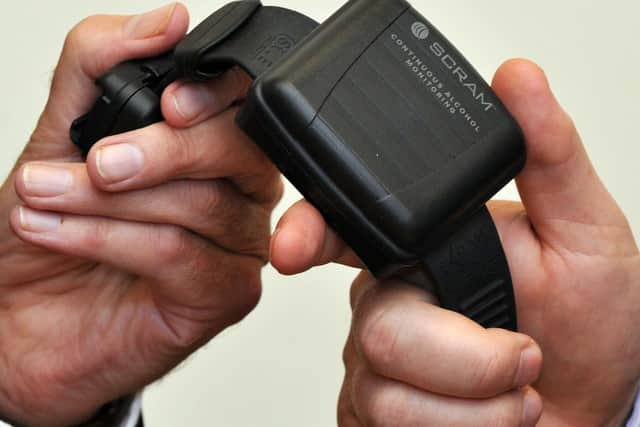'Sobriety tags' to tackle alcohol-fuelled crimes to be rolled out across England two years after trial in Yorkshire
The so-called sobriety tags, which have previously been trialled in Yorkshire and the Humber, will alert the probation service if alcohol is detected in their sweat sample, the Ministry of Justice (MoJ) said.
Offenders caught breaching their drinking ban could face fines or a further sentence in court. The scheme is being launched in England today following a successful rollout in Wales last October.


Advertisement
Hide AdAdvertisement
Hide AdMore than 100 offenders have been tagged in Wales so far and remained sober on more than 95 per cent of the days they were monitored, the MoJ said.
Crime and Policing Minister Kit Malthouse MP said: “These tags have already brought enormous benefit to Wales since they were introduced in October, with one offender I met saying it not only changed his ways, but also saved his life. This smart and powerful new tool is helping the fight against alcohol-fuelled violence, which ruins too many lives and families and creates mayhem in our town centres.”
The tags can distinguish the difference between drinks and other types of alcohol – such as hand sanitiser or perfume.
They work 24/7 and can also tell if someone tries to block contact between the device and their skin.
Advertisement
Hide AdAdvertisement
Hide AdProbation officer Laura Harrison said: “Sobriety tags have had an enormously positive effect on the people I’ve supervised in Wales, improving their mental health, keeping them off drink and out of trouble with the police.
“One man with a history of drink-related violence was given a tag for 90 days and has been sober ever since and says the scheme helped him turn his life around.”
Those fitted with the tags will also receive professional support to help them tackle their drinking issues.
Tags will only be used on offenders over the age of 18, who are not alcohol-dependent or on an alcohol treatment requirement.
Advertisement
Hide AdAdvertisement
Hide AdAlcohol plays a part in 39 per cent of violent crime, with the social and economic cost of drink-related harm around £21.5bn per year, the MoJ said.
It is also seen as one of the drivers of domestic violence and unprovoked attacks.
But when the sobriety tags scheme was announced last May, Richard Piper, the chief executive of Alcohol Change UK, said they “might prove to be a small piece of the jigsaw of measures needed to reduce alcohol harm in the UK”.
He said: “When the time comes, they must be properly evaluated. But to really reduce alcohol harm, they must be surrounded by a comprehensive package of other policies.”
Advertisement
Hide AdAdvertisement
Hide AdPrior to sobriety tags being rolled out nationwide, a pilot scheme in North Yorkshire, Humberside, Lincolnshire had a 97 per cent success in stopping offenders drinking and 94 per cent of offenders successfully completed the period wearing the tag.
The Humberside, Lincolnshire and North Yorkshire Alcohol Abstinence and Monitoring Requirement pilot was carried out for two years from June 2017 until the sentencing powers ended in April 2019.
Half (52 per cent) of wearers were sentenced in Lincolnshire, one-third (33 per cent) in Humberside and 13 per cent in North Yorkshire at the time of receiving the order.
Researchers said defendants reported that it had a positive impact on their lives, wellbeing and behaviour.
Advertisement
Hide AdAdvertisement
Hide AdNorth Yorkshire Police and Crime Commissioner Julia Mulligan said last January: “This has proved to be a successful pilot, with many lessons learned along the way.
"We know alcohol can play a key part in offending for some people, and this appears to have been a positive intervention – reducing offending markedly among those wearing tags. This appears to have been particularly true of domestic violence incidents, something which I hugely welcome given my commitment to reduce violence against women and girls.
“There were areas where the pilot was less successful, with simply not enough tags being used in North Yorkshire compared to elsewhere.
"If we are to roll this programme out in the longer term we would need to learn those lessons and make sure we improved our partnership working, making it clear to everyone involved the benefits these tags can bring.
“These tags have the opportunity to make North Yorkshire a safer place, but there is more work to do and I look forward to seeing the further analysis.”